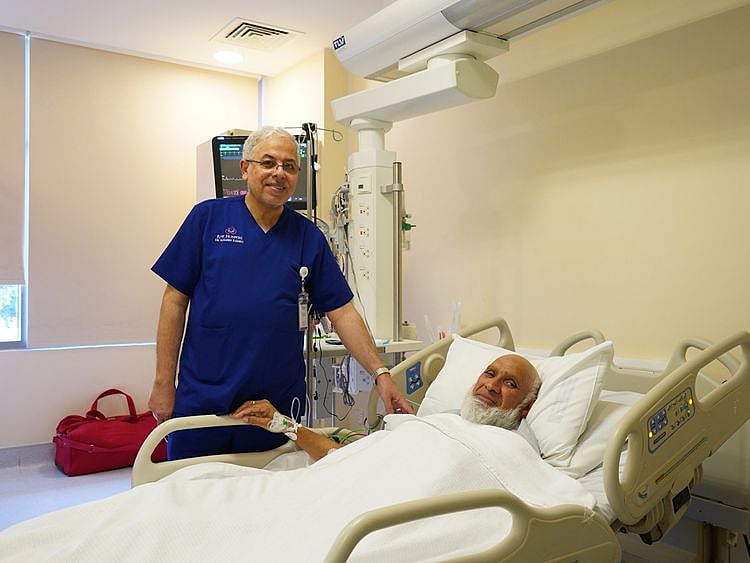UAE: Patient on the verge of heart failure saved using new technology in Ras Al Khaimah
Irregular heart rhythm can trigger stroke, heart-attack and brain clots, warn doctors

Dubai: Heart surgeons at the RAK Hospital saved the life of a patient on the verge of a heart failure, with the help of a breakthrough cardiac defibrillator therapy.
The innovative Cardiac Resynchronisation Therapy with Defibrillator (CRT-D) was used for the first time in a hospital in that emirate and was effective in giving the critically ill patient a new lease of life.
What is CRT-D?
A CRT-D is a special device for patients who are at a high risk of a sudden cardiac arrest. While functioning like a normal pacemaker to treat slow heart rhythms, a CRT-D device also delivers small electrical impulses to the left and right ventricles to help them contract at the same time. This helps the heart pump more efficiently.
The case in question
Islam Gul, a 65-year-old Pakistani national, was recently brought to the hospital in a critical condition. Upon examination, the doctors found him to be suffering from dangerously erratic heartbeat and a very weak heart muscle and multiple comorbidities including high-blood pressure, diabetes and multiple blocked arteries. Gul had a history of frequent episodes of fast chaotic heart rhythm, resulting in fainting spells prior to his admission at the hospital’s Intensive care Unit (ICU).
Multiple comorbidities
Dr Waleed Yasin Kadro, consultant Interventional Cardiologist at the hospital, explained: “The patient was at a very-high risk with multiple comorbidities, several severely blocked arteries and a very weak heart muscle. Any kind of surgery could have been fatal. Therefore, our priority was to strengthen his heart muscle and simultaneously treat his fast and dangerous heart rhythm quickly and effectively since irregular heartbeat could have led to stroke, heart failure and sudden death as well.” He continued: “Considering the delicate condition of the patient, we used the innovative Cardiac Resynchronisation Therapy with Defibrillator (CRT-D). This was the first time such a technology was used at our hospital, providing a new lease of life to a high-risk patient.”
How does the CRT-D help regularise heart rhythms?
A CRT-D device treats dangerously fast heart rhythms (arrhythmias) that can lead to sudden cardiac death. If the device senses heartbeats that are dangerously fast, it delivers a shock to the heart. This shock (defibrillation) stops the abnormal rhythm. Without this life-saving therapy, the dangerously rapid rhythm can lead to death in just a few seconds.
Dr Kadro elaborated on the working of the device: “This device gives electrical stimulation to the left and the right side of the heart simultaneously, causing synchronisation of the heart muscle contraction. At the same time, it strengthens the force of contraction of the heart muscle, allowing the heart to function better. The wire implanted in the right ventricle monitors the heart rhythm and once the heart becomes erratic, it delivers electrical shocks to stop this abnormal rhythm quickly and effectively.”
Patient expresses gratitude
The minimally invasive surgery was carried out under local anaesthesia under the control of X-ray fluoroscopy and was effective in stabilising the patient. Gul was discharged from the hospital within 48 hours. He has been coming to the hospital for regular follow-ups. A relieved Gul told Gulf News: “I’m indebted to the doctors at RAK Hospital for their quick intervention that saved my life.”
Commenting on the breakthrough procedure, Dr Raza Siddiqui, executive director at RAK Hospital said: “As always, RAK Hospital has been at the forefront of introducing technology to improve surgical procedures and to expedite treatments that can be, at times, the decisive factor between life and death. I’d also like to appreciate the RAK Hospital cardiac interventional staff for their quick action, skill and expertise.”
Sign up for the Daily Briefing
Get the latest news and updates straight to your inbox
Network Links
GN StoreDownload our app
© Al Nisr Publishing LLC 2025. All rights reserved.